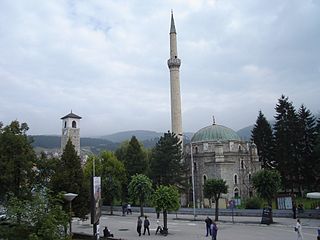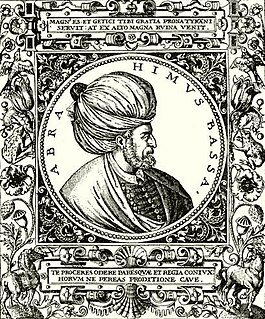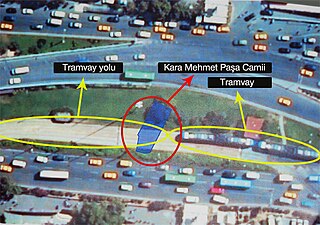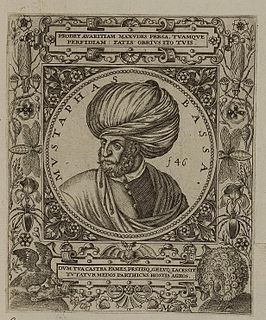 W
WAbbas Helmy I of Egypt was the Wāli of Egypt and Sudan. He was a son of the Albanian Tusun Pasha, and a grandson of the Albanian Muhammad Ali, founder of the reigning Muhammad Ali Dynasty of Egypt and Sudan. The Chambers Biographical Dictionary says of him: "[b]igoted and sensual, he did much to undo the progress made under Muhammad Ali."
Abbas II Helmy Bey was the last Khedive of Egypt and Sudan, ruling from 8 January 1892 to 19 December 1914. In 1914, after the Ottoman Empire joined the Central Powers in World War I, the nationalist Khedive was removed by the British, then ruling Egypt, in favor of his more pro-British uncle, Hussein Kamel, marking the de jure end of Egypt's four-century era as a province of the Ottoman Empire, which had begun in 1517.
 W
WAbdurrahman Abdi Pasha the Albanian was an Ottoman politician and military leader of Albanian descent, who served as the last governor of the province of Budin.
 W
WMuḥammad Bey Abū aḏ-Ḏahab (1735–1775), also just called Abū Ḏahab, was a Mamluk emir and regent of Ottoman Egypt.
 W
WAli Bey al-Kabir (Mgebrishvili) (1728–1773) was a Mamluk leader in Egypt. Nicknamed Jinn Ali and Bulut Kapan ("Cloud-Catcher"), Ali Bey rose to prominence in 1768 when he rebelled against his Ottoman rulers, making the Egypt Eyalet of the Ottoman Empire independent for a short time. His rule ended following the insubordination of his most trusted general, Abu al-Dahab, which led to Ali Bey's downfall and death.
 W
WTrabluslu Ali Pasha, also known as Cezayirli Ali Pasha or Seydi Ali Pasha, was an Ottoman statesman. He served as the Ottoman governor of Egypt from July 1803 to February 1804.
 W
WHekimoğlu Ali Pasha was an Ottoman statesman and military leader who served as Grand Vizier of the Ottoman Empire three times.
 W
WMüezzinzade Ali Pasha was an Ottoman statesman and naval officer. He was the Grand Admiral in command of the Ottoman fleet at the Battle of Lepanto, where he was killed in action. He also served as the governor of Egypt from 1563 to 1566.
 W
WMurad Bey Mohammed was an Egyptian Mamluk chieftain (Bey), cavalry commander and joint ruler of Egypt with Ibrahim Bey. He is often remembered as being a cruel and extortionate ruler, but an energetic courageous fighter.
 W
WCezayirli Gazi Hasan Pasha or Hasan Pasha of Algiers was an Ottoman Grand Admiral (1770–90), Grand Vizier (1790), and general in the late 18th century.
 W
WHurshid Ahmed Pasha was an Ottoman general and Grand Vizier during the early 19th century.
 W
WBodur Hüseyin Pasha was an Ottoman statesman and government official who served many high-level positions in the Ottoman Empire, including governorship of Bosnia (1594–95), of Damascus (1582–83), of Diyarbekir, of Budin, of Aleppo, of Van, of Anatolia, and of Egypt (1573–74).
 W
WKoca Hüsrev Mehmed Pasha was an Ottoman admiral, reformer and statesman, who was Kapudan Pasha of the Ottoman Navy. He reached the position of Grand Vizier rather late in his career, between 2 July 1839 and 8 June 1840 during the reign of Abdulmejid I. However, during the 1820s, he occupied key administrative roles in the fight against regional warlords, the reformation of the army, and the reformation of Turkish attire. He was one of the main statesmen who predicted a war with the Russian Empire, which would eventually be the case with the outbreak of the Crimean War.
 W
WIbrahim Bey was a Mamluk chieftain and regent of Egypt.
 W
WIbrahim Pasha was the eldest son of Muhammad Ali, the Wāli and unrecognised Khedive of Egypt and Sudan. He served as a general in the Egyptian army that his father established during his reign, taking his first command of Egyptian forces when he was merely a teenager. In the final year of his life, he succeeded his still living father as ruler of Egypt and Sudan, due to the latter's ill health. His rule also extended over the other dominions that his father had brought under Egyptian rule, namely Syria, Hejaz, Morea, Thasos, and Crete. Ibrahim pre-deceased his father, dying 10 November 1848, only four months after acceding to the throne. Upon his father's death the following year, the Egyptian throne passed to Ibrahim's nephew, Abbas.
 W
WPargalı Ibrahim Pasha, also known as Frenk Ibrahim Pasha, Makbul Ibrahim Pasha, which later changed to Maktul Ibrahim Pasha after his execution in the Topkapı Palace, was the first Grand Vizier of the Ottoman Empire appointed by Sultan Suleiman the Magnificent.
 W
WIsma'il Pasha, known as Ismail the Magnificent, was the Khedive of Egypt and Sudan from 1863 to 1879, when he was removed at the behest of Great Britain. Sharing the ambitious outlook of his grandfather, Muhammad Ali Pasha, he greatly modernized Egypt and Sudan during his reign, investing heavily in industrial and economic development, urbanization, and the expansion of the country's boundaries in Africa.
 W
WSafranbolulu Izzet Mehmet Pasha was a grand vizier of the Ottoman Empire and served from 1794 to 1798.
 W
WKara Mehmed Pasha was an Ottoman statesman who served as the Ottoman governor of various provinces (eyalets) and sub-provinces (sanjaks). He was also a vizier.
 W
W"Öküz" Mehmed Pasha, also known as Kara Mehmed Pasha or "Kul Kıran" Mehmed Pasha, was an Ottoman statesman, administrator and military figure of the early 17th century who held the office of Grand Vizier twice, the first time from 17 October 1614 to 17 November 1616 and the second time from 18 January 1619 to 23 December 1619. He was also governor of Egypt from 1607 to 1611. Okuz Mehmed's nickname "Kul Kiran" (slavebreaker) came from his success in crushing the mutiny in Egypt during the early 1600s.
 W
W.]]
 W
WMuhammad Ali Pasha al-Mas'ud ibn Agha, known as Muhammad Ali of Egypt and the Sudan, was the Albanian Ottoman governor and the de facto ruler of Egypt from 1805 to 1848, is considered the founder of modern Egypt. At the height of his rule, he controlled Lower Egypt, Upper Egypt, Sudan and parts of Arabia and the entire Levant.
 W
WLala Mustafa Pasha, also known by the additional epithet Kara, was an Ottoman and Bosnian general and Grand Vizier from the Sanjak of Bosnia.
 W
WMohamed Sa'id Pasha was the Wāli of Egypt and Sudan from 1854 until 1863, officially owing fealty to the Ottoman Sultan but in practice exercising virtual independence. He was the fourth son of Muhammad Ali Pasha. Sa'id was a Francophone, educated in Paris.
 W
WKoca Sinan Pasha was an Ottoman Grand Vizier, military figure, and statesman. From 1580 till his death he served five times as Grand Vizier.
 W
WHadım Suleiman Pasha was an Ottoman statesman and military commander. He served as the viceroy of Ottoman Egypt in 1525–1535 and 1537–1538, and as Grand Vizier of the Ottoman Empire between 1541 and 1544. He was a Hungarian eunuch, his epithet hadım meaning "eunuch" in Turkish.
 W
WMohamed Tewfik Pasha, also known as Tawfiq of Egypt, was khedive of Egypt and the Sudan between 1879 and 1892 and the sixth ruler from the Muhammad Ali Dynasty.
 W
WYunus Pasha was an Ottoman statesman. He was Grand Vizier of the Ottoman Empire for eight months in 1517, serving from January 30 until his death on September 13.